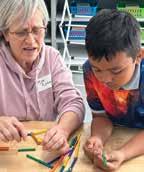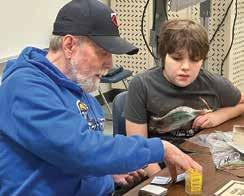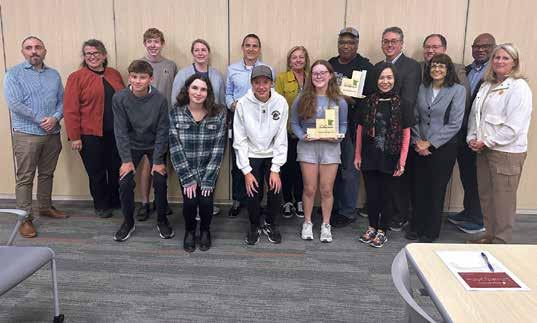Roseville Area Schools






We are pleased to share the 2023-2024 report on the progress and achievements of Roseville Area Schools! This report reflects our unwavering commitment to fostering a vibrant learning environment where every student is empowered to thrive. At the heart of our efforts is a focus on excellence, innovation, and equity in all we do.
Excellence: We strive to provide rigorous, engaging learning experiences that inspire every student to reach their full potential and prepare for a bright future.
Innovation: By embracing new ideas and approaches, we ensure our students are equipped with the skills and knowledge they need to succeed in an ever-changing world.
Equity: We are committed to creating inclusive and supportive spaces where every learner feels valued and has access to the resources they need to succeed.
This report highlights our strategic goals and key strategies to achieve them. It also features Minnesota’s World’s Best Workforce goals and includes inspiring examples across our schools and programs, showcasing incredible work to ensure all students succeed.
Thank you for your continued partnership in building an educational environment where every student is cared for, seen, and supported. Together, we are creating opportunities for all students to thrive.
In Partnership, Dr. Jenny
Loeck Superintendent



Innovation & Equity in All We Do
Each learner experiences a sense of belonging and a joy of learning, is inspired and prepared to reach their potential, and contributes to our communities.
Roseville Area Schools is committed to ensuring an equitable and respectful learning environment for every student, family, and staff member regardless of race, gender, gender identity, sexual orientation, socioeconomic status, ability, home or first language, religion, national origin, age, and physical appearance.
7,676
2023 Graduation Rate: 89.6%
2024 MCA Reading Proficiency: 45.7%
2024 MCA Math Proficiency: 37.9%
2024 Average ACT Composite: 20
2024 Advanced Placement Exams: 610 students participated
Total Early Childhood Family Education and Pre-K enrollment: 550 students
Students receiving Early Childhood Special Education services: 168
Students receiving Early Childhood Screening services: 530
% of students who speak a language other than English at home: 36%
Top 5 home languages (other than English):
1. Spanish 2. Hmong 3. Somali 4. Karen 5. Nepali
Budgeted General Operating Fund: $125 million
Basic per pupil state funding: $7,138
Local revenue sources: $33.4 million (primarily from local property taxes)
Sources of funding: Local 20%, State 72%, Federal 8%
School day breakfasts served (2023-2024): 391,2295
School day lunches served: 884,049 “Super Snacks” served: 92,985
(Cost-saving opportunities for qualifying families)
% of students who qualify: 51%
Students transported daily: 5.500+
Number of bus stops: 789
English language learners: 1,413
Students receiving special education services: 1,548
Students receiving Advanced Academic Talent Development services: 1,035
AVERAGE DAILY
ATTENDANCE:
(compared to the state average of 74.5%)
World’s Best Workforce Areas
All Children are Ready for School
The number of Pre-K students eligible for kindergarten in fall 2024 who score 13 or higher in the myIGDIs rhyming assessment will increase from 48% in spring 2023 to 60% in spring 2024.
All 3rd Graders Can Read at Grade Level
All Racial and Economic Achievement Gaps Between Students are Closed
The percentage of all students enrolled in third grade will increase proficiency on the MCA reading test from 42.7% in 2023 to 48.0% in 2024.
2023-2024 Roseville Area Schools Results
Did not meet, 40% of students scored a 13 or higher
Did not meet; student proficiency increased to 44.0%
All Students Graduate from High School
Math: The racial disparity in math proficiency rates on the Minnesota Comprehensive Assessment (MCA) test for students districtwide (grades 3-11) between Black and White students will decrease by 6 percentage points, from a 39% gap in 2023 to a 33% gap in 2024.
Reading: The racial disparity in reading proficiency rates on the MCA test for students districtwide (grades 3-10) between Hispanic and White students will decrease by 6 percentage points, from a 42% gap in 2023 to a 36% gap in 2024.
The percentage of the All Students group in Roseville Area Schools who graduate in 4 years will increase from 85.2% in 2022 to 90% in 2024.
Math: Did not meet; decreased to 38%
Reading: Did not meet; increased to 44%
These goal areas are established by the state of Minnesota, which school districts are required to address in an annual report.
Aligned with kindergarten by using purposeful play to practice developmental skills
Implemented TS Gold to assess growth and guide interventions through PLCs
Supported social-emotional development with Second Step curriculum and Pyramid Model interventions
Used LETRS and Heggerty to enhance phonological awareness and skills
Invested heavily in best practices elementary reading curriculum focused on science of reading and structural literacy
Trained nearly all K-4 teachers in science of reading and structured literacy practices
K-4 teachers completed over 150 hours of LETRS training over two years
Supported literacy intervention staff through Alternative Delivery of Specialized Services (ADSIS) with approximately $1 million
Recognized reading as a social justice issue
Expected long-term gains in literacy and math from new strategies
Launched first year of reading changes, with proficiency gains anticipated in 2-3 years as younger students advance to MCA testing in grade 3
Offered Cognitively Guided Instruction (CGI) in K-8 to deepen studentcentered math skills
Conducted K-8 math and reading screenings three times annually, with targeted student support
Held Coaching for Equity book study for site administrators and ATPPS lead teachers
In progress; 2023
Graduation Percentage was 89.6%
Established the AVID program in grades 5-12 across all schools, with plans to expand to elementary grades over the coming years
Integrated AVID WICOR strategies—Writing, Inquiry, Collaboration, Organization, and Reading—into School Improvement Plans
Continued advancing our Grading for Equity professional development and practices in grades 7-12
All Students are Ready for Career and College
The district-wide average ACT composite score for all tested students on district contract days will increase from 18.9 in 2023 to 19.0 in 2024.
Goal met; Composite score for 2024 was 20.0
Implemented Xello, an online college and career readiness pathway program in grades 9-12
Expanded career readiness pathways and course options at the secondary level
Offered certifications in various fields for high school students
Enabled students to earn college credit through Advanced Placement, Concurrent Enrollment, College in the Schools, and Post-Secondary Education Options
Our graduates are prepared to achieve their goals and aspirations.
• Ensure students are college- and career-ready
• Deliver a challenging, joyful, and safe learning environment
• Deliver innovative, effective practices and systems
Our learners contribute to an equitable, caring society.
• Cultivate student engagement and joy in learning
• Support learner resiliency (student social and emotional learning and mental health)
• Amplify student leadership and voice in decision-making
• Prepare learners to be racially and socially responsive
We are a culturally responsive, inclusive, anti-racist district.
• Ensure educator commitment to anti-racist practices
• Hire and retain a diverse workforce
• Develop equitable leaders
• Develop a culturally responsive evaluation system
• Build a culture of belonging where all feel welcome, included, and safe
The community is united behind meeting student needs.
• Partner with families and the community to support student success
• Build a culture of belonging
We are financially secure.
• Cultivate and maintain community trust
• Secure and allocate financial resources to support the district’s mission and vision





Roseville Area Schools’ AVID program, which is expanding to Pre-K through grade 12 by 2027, prepares students for success in college, careers, or trades. Focused on equity, it fosters academic, organizational, and life skills while ensuring all students thrive in a respectful, inclusive environment, guided by the district’s commitment to equity and lifelong success.
a
In Roseville Area Schools, mentor-mentee relationships thrive as older students guide younger peers, fostering leadership, empathy, and inspiration. These partnerships build confidence, encourage mutual learning, and create a supportive community where shared experiences strengthen connections and growth for all.

Roseville Area Schools implemented a Science of Reading-based curriculum for all students in grades K-6 that incorporates the Minnesota academic standards for English Language Arts.

“ “
I believe that we are at an important moment in education where science and research have the potential to transform the way we teach kids to read. We are so lucky in Roseville to have been given both the foundational knowledge we need and also to have chosen new curricula that align with the science.
— Brandon Button, Equity Advancement Literacy Lead
★
RAHS chemistry students visited Emmet D. Williams Elementary to work with 4th grade students. The RAHS students had the opportunity to try teaching science as a possible career choice while EDW students, in turn, worked on experiments that align with the science standards.




At Edgerton Elementary, a 5th-grade student planning committee demonstrated exceptional leadership by organizing the first annual Edgerton Stories event. Meeting weekly as a “lunch bunch,” they prioritized inclusivity and diverse perspectives, creating cultural stations to celebrate their community.
Harambee Elementary, an environmental sciences-focused school, hosts family events in the school’s Nature Play Area so families can join in the joy of outdoor fun and exploration. These events, featuring activities like mud kitchens and creative play in an outdoor playhouse, highlight the many ways students engage with this unique space year-round.
Roseville Area Schools launched a new initiative, partnering with an outside agency to provide in-school mental health therapy. This initiative addresses rising student mental health challenges, removes barriers to care for families, and supports attendance and learning by meeting students’ mental health needs directly at school.

Superintendent Jenny Loeck and Executive Director of Student Services Niceta Thomas invited four AVID seniors from Roseville Area High School to share their experiences and insights with community audiences, including the Rotary Club of Roseville, the Roseville Area Optimist Club, and the Association of Metropolitan School Districts. The students delivered powerful presentations, eloquently addressing the strategic plan’s goal areas 1-4 and highlighting how Roseville Area Schools have positively impacted their educational journeys.
We are a culturally responsive, inclusive, anti-racist district.

The Future-Oriented Community of United Support (FOCUS) is a program designed to support BIPOC (Black, Indigenous, and People of Color) educators in Roseville Area Schools by addressing inequities, fostering systemic change, and empowering collective advocacy. Through the Teacher Mentorship & Retention of Effective Teachers (TMRG) grant, the initiative prioritizes the retention of BIPOC teachers in Roseville Area Schools. FOCUS is building an intra-district network of BIPOC educators, with an emphasis on professional development and self-care.
Over two years, administrative leaders in Roseville Area Schools conducted a book study using Coaching for Equity by Elena Aguilar to develop principals and administrators in Roseville Area Schools as equitable leaders. The study empowered leaders to engage in purposeful conversations, build trust, and develop skills as equity coaches. Leaders also learned how to implement strategies for disrupting inequities and creating inclusive, thriving school environments.

To address racial disparities, Roseville Area Schools is aligning systems to student needs through AVID Elementary, K-6 English Language Arts curriculum, equitable grading practices, science-based reading instruction, and training Raider Support staff on hidden biases and culturally responsive practices, fostering new learning and sustained implementation of equitable practices.

Roseville Area Schools’ back-to-school workshop for all staff highlighted Native American culture with keynote speaker Dr. Anton Treuer (pictured), a professor of Ojibwe at Bemidji State University and noted author, and facilitator Odia Wood-Krueger, the author of A Guide to Reliable Native AmericanRelated Teaching Resources. This event equipped educators with culturally responsive tools to foster inclusivity and honor the diverse histories and experiences of Native American communities.
We are a culturally responsive, inclusive, anti-racist district.
Key Strategy: Build a culture of belonging where all feel welcome, included, and safe
Roseville Area Schools is committed to improving language access, ensuring families can actively engage in their students’ learning. Following a language audit and gap analysis in fall 2023, the district is implementing sustainable processes and procedures based on recommendations to better meet the language needs of parents and guardians.

The freedom to express oneself through language is a fundamental human right.



To ensure families have easy access to important news and information about their student’s education, Roseville Area Schools has upgraded to a new website platform and a new newsletter system. Both platforms include translation features to better serve our diverse community.

As an anti-racist school district, Roseville Area Schools desires an evaluation tool that measures the effectiveness of the district’s strategic plan anti-racist work in the classroom. Guided by our strategic plan, the Teacher Evaluation Committee will phase work over two years, including system review, national research, and implementing improvements in collaboration with stakeholders to enhance teacher evaluations and support student success.
Superintendent Jenny Loeck is partnering with Do Good Roseville founder Kathy Ramundt to lead the Community Advisory Council, a group dedicated to fostering strong relationships and partnerships between the school district and the community. A healthy partnership is vital to ensuring the success and well-being of our students and staff, as it encourages collaboration, understanding, and shared responsibility in addressing challenges and creating opportunities for growth.

Roseville Area Schools values strong relationships with community businesses, organizations, and individuals who support our students. From volunteers who read, play games, and knit hats, to organizations promoting voting, addressing food needs, and funding scholarships, we are deeply fortunate for the shared commitment to enriching the lives of our learners.


Roseville Area Schools’ Choose Roseville initiative highlights our commitment to equity and excellence, encouraging staff and families to select Roseville as their district. Guided by our equity vision, we prioritize supporting all students and families through intentional actions, fostering an inclusive environment where every learner thrives and feels valued daily.

Our district is deeply committed to sustainable practices, as demonstrated by Roseville Area Schools and Roseville Area High School being honored as the first district and school in Minnesota to receive the Minnesota GreenStep recognition. This achievement was spearheaded by the RAHS Students for Climate Action group, whose passion for environmental sustainability inspired the district’s leadership.
We are incredibly proud of our students’ leadership and commitment to creating a greener future.
“
— Dr. Jenny Loeck, Superintendent, Roseville Area Schools
At Fairview Alternative High School, students explore real-world climate change solutions, using data from the school’s solar panels to track energy generation and CO2 emissions saved. In 2024, the entire school learned about how their building uses renewable solar energy. Principal Laura Freer praised the initiative: “Our students are developing creative, data-driven solutions that inspire meaningful change.”


Members of RAHS Students for Climate Action attended a Roseville Area School Board meeting and were recognized for their work on the GreenStep award.
In a school district budget, the fund balance is the surplus of funds remaining after all expenses are paid, serving as a financial cushion to cover unexpected costs or revenue shortfalls. Roseville Area Schools is committed to continuing to grow its fund balance to ensure it can continue to support students and staff in times of uncertainty.









AchievementReport:https://bit.ly/623AchievementReport
ProgramParticipationReport:https://bit.ly/623ProgramParticipation
Roseville Area Schools
Accountability Reports
GraduationandPost-SecondaryReport:https://bit.ly/623GraduationReport
CollegeandCareerReadinessReport:https://bit.ly/623CollegeCareerReadiness
SchoolClimateReport:https://bit.ly/623SchoolClimateReport
StaffDiversityReport:mhttps://bit.ly/StaffingDiversityReport
EnrollmentandDemographicReport:https://bit.ly/EnrollmentDemographic